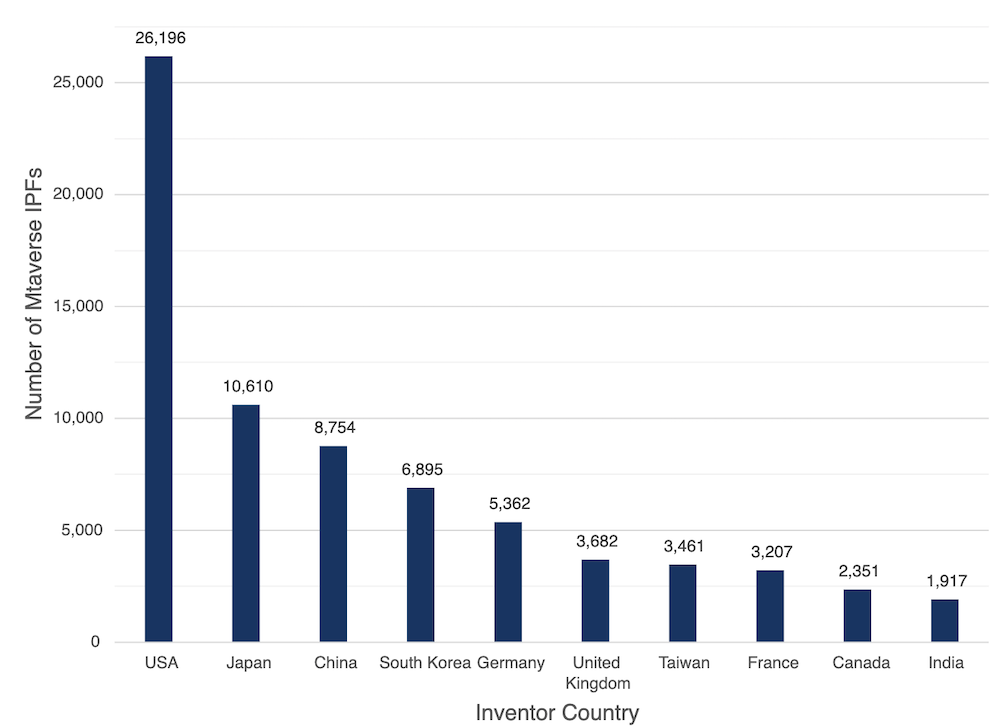The metaverse is a rapidly expanding virtual space that has captured the attention of individuals, businesses, and governments worldwide. With its potential to revolutionise how we interact, work, and play in this virtual environment, it is no surprise that countries are taking notice of this emerging technology. In particular, the UK government has analysed the metaverse’s intellectual property landscape, highlighting IP and trademark applications for this digital frontier.
The UK government’s report reveals a surge in metaverse-related patent filings, with 71,738 international patent families (IPFs) identified as of June 30, 2021. IPFs are patent applications filed in at least two different countries. This surge indicates the growing interest and investment in metaverse technologies, with a notable increase observed from 2015 to 2018. The United States leads in the number of IPFs, showcasing its pioneering role in this digital landscape, while Japan holds second place.
Among companies, Qualcomm owns the most IPFs in this domain, while Huawei also showcases rapid growth in metaverse-related filings. The annual count of metaverse IPFs published by Huawei has seen a substantial rise, with a 190% increase from 48 in 2015 to 140 in 2021.

Trademark Activity Reflects the Shift Towards Services
In addition to patent filings, trademark activity related to the metaverse has also seen exponential growth. By June 30, 2023, there were 31,503 UK trademark applications in this domain. Interestingly, recent years have shifted from goods to service-related applications, reflecting the evolving nature of the metaverse economy. Between 2014 and 2018, trade mark applications featuring virtual reality terms in their descriptions saw a fivefold increase, with virtual reality specifications appearing in approximately 2.36% of all UK trade mark applications by 2022, according to the report.
With the metaverse expected to reach over 1.4 billion users and a market volume of $490.4 billion by 2030, the UK’s analysis sheds light on the dynamic IP activities shaping this sector. This filing surge mirrors the escalating interest in the metaverse. It signals the need for regulation and understanding of its broader implications. Moreover, as the Metaverse continues to evolve, monitoring and analysing IP trends will be crucial for ensuring a balanced approach to regulation.
The UK’s focused contribution to metaverse technologies and its active role in shaping the future digital landscape shows intellectual property’s importance in driving this digital frontier forward.
In conclusion, the UK’s analysis of metaverse intellectual property highlights the country’s growing interest in shaping the Metaverse. As we look towards the future and the continued growth of the metaverse, it is clear that monitoring and understanding IP trends will be crucial for fostering innovation.
Read More: nftnewstoday.com









 Bitcoin
Bitcoin  Ethereum
Ethereum  XRP
XRP  Tether
Tether  Solana
Solana  Dogecoin
Dogecoin  USDC
USDC  Cardano
Cardano  Lido Staked Ether
Lido Staked Ether  TRON
TRON  Avalanche
Avalanche  Sui
Sui  Wrapped stETH
Wrapped stETH  Chainlink
Chainlink  Toncoin
Toncoin  Shiba Inu
Shiba Inu  Stellar
Stellar  Wrapped Bitcoin
Wrapped Bitcoin  Hedera
Hedera  Polkadot
Polkadot  WETH
WETH  Bitcoin Cash
Bitcoin Cash  Uniswap
Uniswap  Pepe
Pepe  Hyperliquid
Hyperliquid  LEO Token
LEO Token  Litecoin
Litecoin  Wrapped eETH
Wrapped eETH  NEAR Protocol
NEAR Protocol  Ethena USDe
Ethena USDe  Internet Computer
Internet Computer  USDS
USDS  Aptos
Aptos  Aave
Aave  Mantle
Mantle  Bittensor
Bittensor  POL (ex-MATIC)
POL (ex-MATIC)  Virtuals Protocol
Virtuals Protocol  Cronos
Cronos  Ethereum Classic
Ethereum Classic  Render
Render  Artificial Superintelligence Alliance
Artificial Superintelligence Alliance  MANTRA
MANTRA  Tokenize Xchange
Tokenize Xchange  Ethena
Ethena  Arbitrum
Arbitrum  WhiteBIT Coin
WhiteBIT Coin